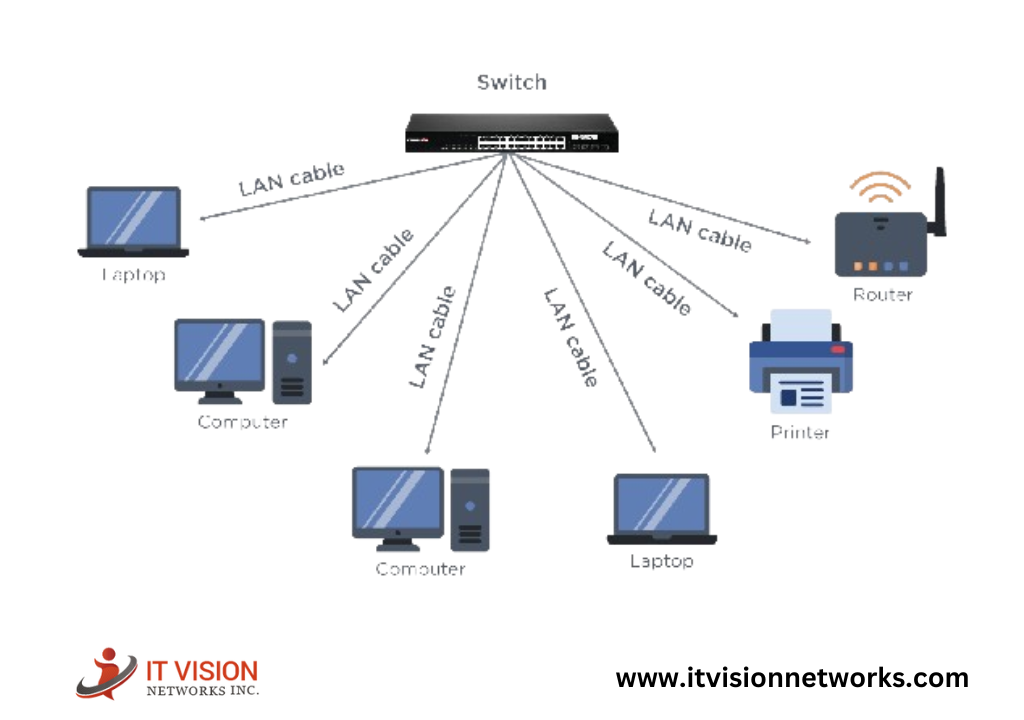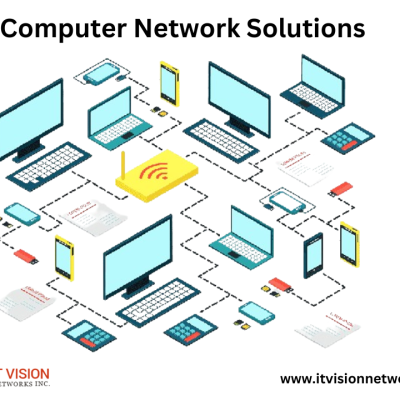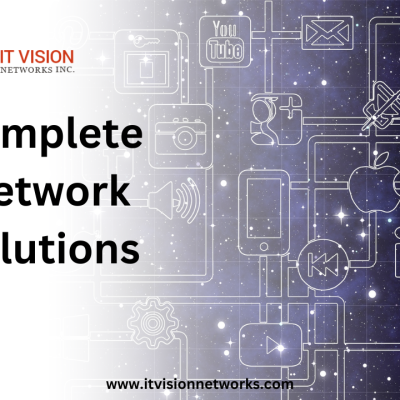Nowadays enterprise network solution plays a very important role in the development of modern companies. In the rapidly shifting age of digitalization, businesses worldwide turn to well-configured and reliable network infrastructure to allow their staff, devices, and systems to be interconnected without friction. These present the data transfer system, means of communication and collaboration within the organization. Network solutions from an enterprise point of view can help businesses improve their throughput, increasing their efficiency and giving them a better chance of achieving success in the field.
Importance of Enterprise Network Solutions for Businesses
The value of enterprise network solutions needs not to fall short of their worth. They are the central of today’s businesses that are offering fast, seamless connection at work, transferring data, and sharing resources. Using a network system that is incorporated into a business plan strategically, the businesses will be able to manage their productivity, reduce interruptions, and raise the level of their customers’ services.
Enterprise network solutions provide various incentives for organizations such as communication improvement, increased scalability, higher security, and simplicity in their management. By organizing these enablers into their strategic plan, businesses can position themselves competitively in the current surroundings of the digital arena.
Types of Enterprise Network Solutions
There are various types of enterprise network solutions available, each catering to specific business needs. Some common examples include:
- Network Enterprise Solutions: These solutions encompass the entire network infrastructure, including hardware, software, protocols, and configurations. They provide a comprehensive approach to network management, ensuring optimal performance and reliability.
- Enterprise Network Security Solutions: Security is a top concern for businesses today. These solutions focus on protecting the network from external threats, such as unauthorized access, malware, and data breaches. They include firewalls, intrusion detection systems, virtual private networks (VPNs), and encryption technologies.
- Enterprise Network Monitoring Solutions: Monitoring solutions enable businesses to proactively identify and address network issues. They provide real-time visibility into network performance, bandwidth utilization, and device health. This allows organizations to optimize their network resources and ensure uninterrupted operations.
- Enterprise Wireless Network Solutions: With the rise of mobile devices and remote work, wireless networks have become essential for business connectivity. These solutions enable seamless wireless access across the enterprise, providing reliable and secure connectivity for employees, customers, and IoT devices.
- Enterprise Network Backup Solutions: Data loss can have severe consequences for businesses. Backup solutions ensure that critical data is regularly backed up and can be quickly restored in the event of a disaster. They include backup servers, storage devices, and cloud-based backup services.
- Enterprise Network Storage Solutions: As data volumes continue to grow, businesses need efficient and scalable storage solutions. These solutions provide centralized storage systems that can accommodate large amounts of data while ensuring data integrity, availability, and performance.
Benefits of Using Enterprise Network Solutions
Implementing enterprise network solutions offers numerous benefits for businesses:
- Improved Communication and Collaboration: Enterprise network solutions enable seamless communication and collaboration across departments, locations, and devices. This enhances productivity and teamwork, as employees can easily share information, access resources, and collaborate on projects.
- Increased Scalability: As businesses grow, their network infrastructure needs to scale accordingly. Enterprise network solutions provide the flexibility to expand and adapt to changing business requirements, ensuring that the network can support increased traffic, users, and devices.
- Enhanced Security: Protecting sensitive data and preventing unauthorized access is critical for businesses. Enterprise network security solutions provide robust security measures, such as firewalls, encryption, and access controls, to safeguard the network and data from cyber threats.
- Simplified Management: Managing a complex network infrastructure can be challenging. Enterprise network solutions offer centralized management tools, automation capabilities, and monitoring systems, making it easier for IT teams to manage and maintain the network effectively.
Understanding Enterprise Network Security Solutions
Enterprise network security solutions play a vital role in protecting businesses from cyber threats and ensuring the confidentiality, integrity, and availability of data. With the increasing sophistication of cyber attacks, organizations must have a comprehensive security strategy in place.
These solutions encompass a range of technologies and practices aimed at securing the network infrastructure. Some key components of enterprise network security solutions include:
- Firewalls: Firewalls act as a barrier between the internal network and external threats. They monitor and control incoming and outgoing network traffic based on predefined security rules, preventing unauthorized access and protecting against malicious activities.
- Intrusion Detection Systems (IDS) and Intrusion Prevention Systems (IPS): IDS and IPS solutions detect and prevent unauthorized access, malware, and other threats. They analyze network traffic, identify suspicious patterns or anomalies, and take appropriate action to prevent potential attacks.
- Virtual Private Networks (VPNs): VPNs provide secure remote access to the enterprise network. They encrypt network traffic, ensuring the confidentiality of data transmitted over public networks. VPNs are essential for remote workers, branch offices, and business partners connecting to the corporate network.
- Encryption Technologies: Encryption is a critical component of network security. It ensures that data transmitted over the network is protected from interception and unauthorized access. Encryption technologies use algorithms to convert data into ciphertext, which can only be decrypted with the appropriate encryption keys.
Implementing enterprise network security solutions requires a proactive approach to identify vulnerabilities, assess risks, and implement appropriate security controls. Regular security audits, employee training, and incident response plans are essential to maintain a robust and secure network infrastructure.
Implementing Enterprise Network Monitoring Solutions
Effective network monitoring is essential for maintaining optimal network performance, identifying issues, and ensuring uninterrupted business operations. Enterprise network monitoring solutions provide real-time visibility into the network infrastructure, enabling IT teams to proactively monitor and manage network resources.
These solutions offer a range of features and capabilities, including:
- Real-time Monitoring: Network monitoring solutions continuously monitor network traffic, devices, and applications, providing real-time insights into network performance and health. This allows IT teams to identify bottlenecks, troubleshoot issues, and optimize network resources.
- Alerting and Notifications: Monitoring solutions can send alerts and notifications when predefined thresholds or anomalies are detected. This enables IT teams to take immediate action to address potential issues before they impact business operations.
- Performance Analytics: Network monitoring solutions often include advanced analytics capabilities, allowing IT teams to analyze historical data, identify trends, and make informed decisions to optimize network performance. These insights can help businesses improve resource allocation, capacity planning, and troubleshooting.
- Scalability and Flexibility: Enterprise network monitoring solutions should be scalable to accommodate the growing network infrastructure. They should support a wide range of devices, protocols, and technologies, ensuring comprehensive visibility across the entire network.
By implementing enterprise network monitoring solutions, businesses can proactively manage their network infrastructure, optimize performance, and ensure a seamless user experience.
Enhancing Connectivity with Enterprise Wireless Network Solutions
In today’s digital landscape, wireless connectivity is no longer a luxury; it is a necessity for businesses. Enterprise wireless network solutions provide reliable and secure wireless access across the organization, enabling employees, customers, and IoT devices to connect seamlessly.
These solutions offer a range of benefits, including:
- Increased Mobility and Productivity: Wireless networks allow employees to work from anywhere within the premises, promoting mobility and flexibility. This enhances productivity as employees can access resources, collaborate, and communicate on the go.
- Seamless BYOD (Bring Your Device): With the rise of mobile devices, employees often prefer to use their smartphones, tablets, or laptops for work. Enterprise wireless network solutions enable secure and seamless connectivity for these devices, ensuring that employees can leverage their preferred devices without compromising security.
- Guest Access: Many businesses need to provide wireless access to guests, such as customers, partners, or vendors. Enterprise wireless network solutions offer guest access features, allowing businesses to provide controlled and secure internet access without compromising their internal network security.
- Scalability and Flexibility: Wireless networks can scale easily to accommodate an increased number of users and devices. Enterprise wireless network solutions should support a large number of simultaneous connections, provide seamless roaming, and offer high-performance wireless access points.
To enhance connectivity and enable a mobile workforce, businesses should invest in reliable and secure enterprise wireless network solutions.
Exploring Enterprise Network Backup Solutions
Data loss can have severe consequences for businesses, ranging from financial losses to reputational damage. Enterprise network backup solutions provide a reliable and efficient way to protect critical data and ensure its availability in the event of a disaster.
Some key features and benefits of enterprise network backup solutions include:
- Regular Data Backup: Backup solutions automate the process of regularly backing up critical data, ensuring that it is protected from accidental deletion, hardware failures, or natural disasters. They create copies of data and store them in secure locations, such as backup servers, offsite facilities, or cloud storage.
- Rapid Data Recovery: In the event of data loss, backup solutions enable businesses to quickly restore the backed-up data, minimizing downtime and reducing the impact on business operations. This is crucial for maintaining business continuity and meeting recovery time objectives (RTOs).
- Data Versioning and Point-in-Time Recovery: Backup solutions often offer versioning capabilities, allowing businesses to restore data to a specific point in time. This is useful in scenarios where data corruption or accidental changes need to be reversed.
- Scalability and Storage Efficiency: Enterprise network backup solutions should be scalable to accommodate the growing data volumes. They should also offer storage efficiency features, such as deduplication and compression, to optimize storage space and reduce backup costs.
Implementing a robust network backup solution is essential for businesses to protect their critical data, ensure business continuity, and comply with data protection regulations.
Choosing the Right Enterprise Network Storage Solutions
As businesses generate and accumulate vast amounts of data, efficient and scalable storage solutions are essential. Enterprise network storage solutions provide centralized storage systems that can accommodate large data volumes, ensure data availability, and optimize storage resources.
Consider the following factors when choosing enterprise network storage solutions:
- Storage Capacity: Assess your current and future storage requirements to determine the capacity needed. Consider factors such as data growth rate, retention policies, and application requirements. Choose storage solutions that offer scalability, allowing you to easily expand storage capacity as needed.
- Performance and Latency: Evaluate the performance requirements of your applications and workloads. Consider factors such as IOPS (Input/Output Operations Per Second), throughput, and latency. Choose storage solutions that can deliver the required performance levels to meet your business needs.
- Data Protection and Redundancy: Data loss can have severe consequences for businesses. Choose storage solutions that offer data protection features such as RAID (Redundant Array of Independent Disks), replication, and snapshot capabilities. These features ensure data availability and protect against hardware failures or disasters.
- Storage Architecture: Consider the storage architecture that best suits your business needs. Options include direct-attached storage (DAS), network-attached storage (NAS), and storage area network (SAN). Evaluate the benefits and limitations of each architecture to make an informed decision.
- Integration and Compatibility: Ensure that the storage solutions you choose are compatible with your existing infrastructure and applications. Consider factors such as interoperability, integration with backup and disaster recovery solutions, and support for industry standards.
Choosing the right enterprise network storage solutions is crucial for businesses to ensure efficient data storage, availability, and scalability.
How to Integrate Enterprise Network Solutions into Your Business
Integrating enterprise network solutions into your business requires careful planning and implementation. Consider the following steps to ensure a smooth integration:
- Assess Your Business Needs: Identify your business requirements and pain points that can be addressed by enterprise network solutions. Consider factors such as communication, collaboration, security, scalability, and data storage. This assessment will help you determine the most suitable solutions for your business.
- Define Your Network Architecture: Develop a network architecture that aligns with your business goals and requirements. Consider factors such as network topology, hardware components and software components, security measures, and connectivity options. This architecture will serve as the blueprint for implementing enterprise network solutions.
- Choose the Right Solutions: Select the enterprise network solutions that best meet your business needs. Consider factors such as functionality, scalability, security, ease of use, and vendor support. Evaluate multiple solutions and choose those that align with your network architecture and business goals.
- Plan and Execute the Implementation: Develop a comprehensive implementation plan that includes tasks, timelines, resource allocation, and testing procedures. Ensure that all stakeholders are involved and informed throughout the implementation process. Execute the plan systematically, addressing any issues or challenges that arise.
- Train and Educate Employees: Provide training and education to employees on using the new enterprise network solutions. This will ensure that they can effectively leverage the solutions to enhance their productivity and collaboration. Regular training sessions and communication channels should be established to address any questions or concerns.
- Monitor and Optimize: Once the enterprise network solutions are implemented, monitor their performance, security, and usability. Regularly assess the network infrastructure, gather feedback from users, and make necessary adjustments to optimize the solutions.
By following these steps, businesses can successfully integrate enterprise network solutions and unlock the power of connectivity for enhanced productivity and success.
Future Trends in Enterprise Network Solutions
The field of enterprise network solutions continues to evolve rapidly, driven by technological advancements and changing business requirements. Some key trends that are shaping the future of enterprise network solutions include:
- Software-Defined Networking (SDN): SDN is revolutionizing network management by separating the control plane from the data plane. This enables centralized network control, automation, and programmability, making networks more agile, flexible, and scalable.
- Network Function Virtualization (NFV): NFV decouples network functions from dedicated hardware appliances and virtualizes them, running them on standard servers. This allows businesses to optimize resource utilization, reduce costs, and rapidly deploy and scale network services.
- Cloud-Based Networking: Cloud computing is transforming the way businesses operate and manage their networks. Cloud-based networking solutions offer scalability, agility, and cost-efficiency, allowing businesses to leverage the power of the cloud for their network infrastructure.
- Internet of Things (IoT) Integration: The proliferation of IoT devices is placing new demands on enterprise networks. Network solutions need to support the massive scale, diverse connectivity, and security requirements of IoT devices, enabling businesses to harness the potential of IoT for improved efficiency and innovation.
- Artificial Intelligence (AI) and Machine Learning (ML): AI and ML technologies are increasingly being used in network solutions to optimize performance, detect anomalies, and automate network management tasks. These technologies enable businesses to proactively identify and address network issues, enhance security, and improve user experiences.
As businesses embrace these trends, they can stay ahead of the competition, drive innovation, and unlock new growth opportunities.
Conclusion
Enterprise network solutions play a critical role in driving business success by unlocking the power of connectivity. From enabling seamless communication and collaboration to ensuring data security and scalability, these solutions provide the foundation for a robust and efficient network infrastructure. By understanding the different types of enterprise network solutions, businesses can choose the right






